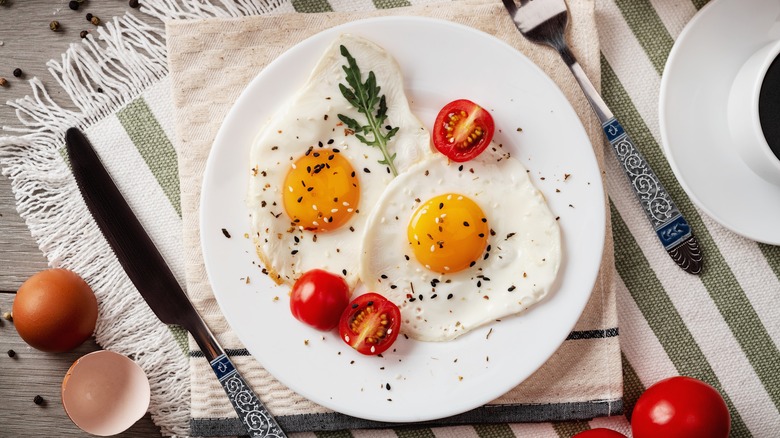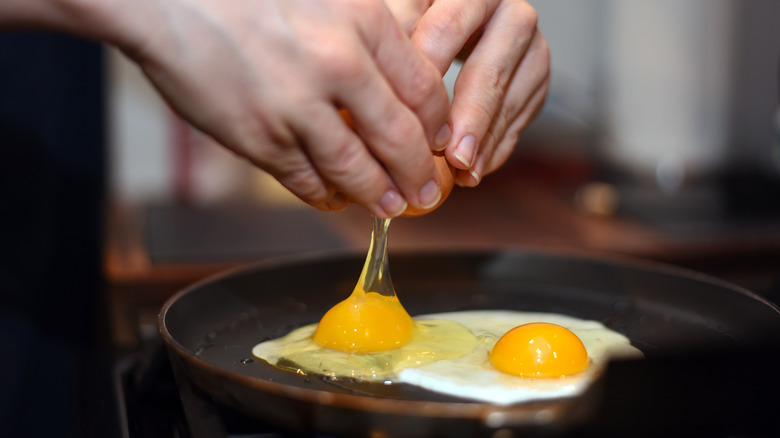Fry Room Temperature Eggs And You'll Never Overcook Them Again
Eggs look simple enough, but appearances can be deceiving. This protein-packed food can be cooked in many different ways. From fluffy scrambled eggs to gently poached eggs, each type requires a special touch and technique. Fried eggs are no exception. In fact, they can be particularly finicky to prepare.
If you've ever overcooked a fried egg, you're not alone. There's a very fine line between a tender, opaque egg white and a rubbery one with unappetizingly crispy edges. Not to mention the difficulty in achieving a yolk that's set just right. While factors such as freshness and fat affect how your eggs turn out, a less-than-satisfying end result often has to do with temperature. And not just the temperature of your frying pan, though that's important too, but the temperature of the eggs themselves.
Assuming you keep your eggs in the fridge, which you should if you live in the United States, and cook them as soon as you pull them out, the odds are stacked against you before you even crack the first egg. The secret to stop overcooking eggs is to stop frying them when they're cold. Instead, you should let them warm up to room temperature before you get cooking. While this strategy might sound as deceptively simple as eggs look, here's why it works.
What's so special about room temperature eggs?
When frying an egg, you're aiming to hit the ideal texture and doneness of the white and the yolk at the same time. While the perfect fried egg might be subjective, the standard is a white that's free of bubbles, crispy bits, and browned portions surrounding an unbroken yolk that's thickened but not hard. An overcooked fried egg has a rubbery and visibly burnt white and a yolk that's far too set to deliver that satisfying runniness when punctured.
The science behind synchronizing the ideal cook of white and yolk comes down to protein coagulation. According to the Egg Safety Center, an egg white coagulates at 144 to 149 degrees Fahrenheit, while the yolk coagulates at 149 to 158 degrees Fahrenheit. This means the proteins in each part go from a fluid state to a solid state at different temperatures. Since egg whites have more protein and higher water content than egg yolks, which are thicker and fattier, the whites cook faster.
When you fry an egg that's just come out of the fridge, the colder temperature exacerbates the problem that the white sets faster than the yolk. A cold white can steam when cracked into a hot pan, causing the white to cook even more rapidly than usual without leaving the yolk enough time to set to its ideal doneness. While frying eggs on low-medium heat can help, chef Robert Irvine advises allowing eggs — and all ingredients in general – to reach room temperature before cooking. This will help you avoid dropping the frying pan's temperature (when a cold egg is added) and ultimately achieve an even cook.
Getting eggs to room temperature quickly
Frying an egg only takes a few minutes, but getting one to room temperature takes a little longer. If you're planning to make fried eggs for breakfast (or any meal), you might be wondering when you should take your eggs out of the fridge. Thankfully, there's no need to set any extra early alarms and stumble into the kitchen half-asleep. Mornings can be hard enough as it is — you don't need to lose sleep over eggs in order to cook them well.
Depending on how much time you have, there are two methods you can use to get your eggs to room temp, or between 68 and 72 degrees Fahrenheit. If you aren't rushing out the door any time soon, you can pull your eggs out of the fridge less than an hour before frying. Note that you shouldn't leave them out for longer than two hours though. Set the eggs you plan to cook on a towel. (If you leave them in the carton, they'll take longer to warm up.) After about 30 minutes, they should be ready to crack into a pan. If you're short on time, water can work wonders to speed up the process. Gently place your eggs in a bowl of warm (not hot) water. Leave them to sit fully submerged for 10–15 minutes. Once the eggs are at the same temperature as the water, it's time to get frying.
Cooking eggs to perfection is a challenging kitchen feat that even renowned culinary experts struggle to master. However, with this temperature tip at your disposal, you can hone your egg frying skills until overcooked eggs are just a distant memory.


